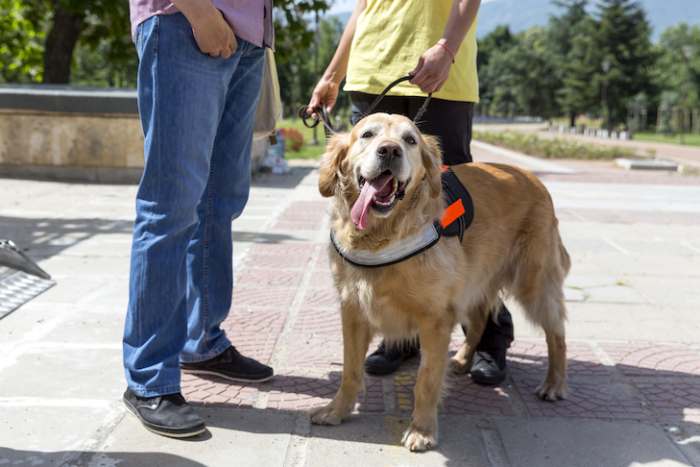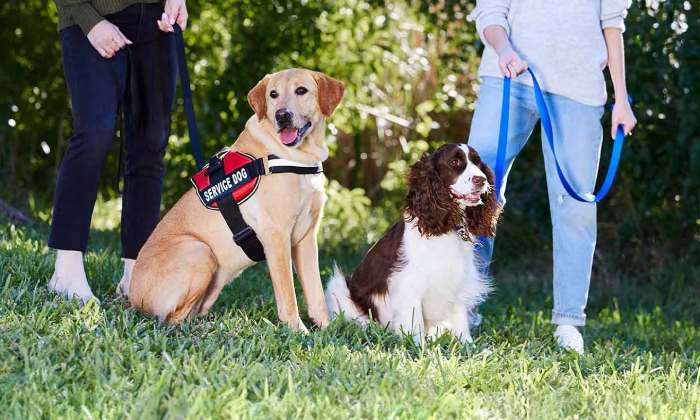Are Service Dogs Allowed Everywhere? You may have seen them in airports, restaurants, and other public places. Service dogs are a symbol of independence and safety for many people. But are they allowed everywhere?
Service dogs are protected by laws that guarantee their rights, and they have access to most public places. To qualify for a service dog, an individual must meet certain training requirements. However, there are some exceptions to these rules.
Understanding the rules and rights of service dogs can help ensure they receive the respect they deserve.
Legal Leash: Understanding Laws for Service Dog Access
You need to know the laws about service dogs before you take yours everywhere. Generally, service dogs are allowed anywhere the public is allowed to go. This includes restaurants, stores, and even airplanes. To qualify for service dog status, the dog must be trained to perform a specific task to help mitigate a disability. The Americans with Disabilities Act (ADA) outlines the certification standards that must be met, as well as the responsibilities of the handler.

However, emotional support animals aren’t protected under the ADA and may not be allowed in all public places. Additionally, businesses and other venues can impose restrictions, as long as they aren’t blanket bans on service dogs.
To ensure the safety and well-being of your service dog, it’s important to understand your rights and be aware of any potential obligations.
Rights Unleashed: Where Service Dogs Are Allowed
Understanding your rights as a service dog handler is essential for ensuring your pet’s safety and access to public places. As a service dog handler, you have certain rights, including access to housing and public places with your service dog. The Americans with Disabilities Act (ADA) and Fair Housing Act (FHA) protect your service dog’s rights to accompany you in housing and public places.
| Public Places | Housing | Emotional Support |
|---|---|---|
| Yes | Yes | No |
| ADA | FHA | N/A |
It’s important to know that service dogs are not the same as emotional support animals and, as such, have different rights and regulations. Service dogs are covered by federal protection and are allowed access to public places, whereas the ADA does not cover emotional support animals. It’s also important to note that some states have additional laws allowing service dogs access to places not covered by the ADA. Knowing your rights as a service dog handler is critical for protecting you and your pet.
Public Access 101: Navigating Everyday Spaces
Since service dogs are protected under the ADA and FHA, they’re generally allowed access to public places. But what does this mean? To ensure interaction safely and responsibly with other people and animals, here are 3 key points to consider:
- Service dogs should wear a vest identifying them as such and must be under the control of their handler at all times.
- Service dogs must be trained to perform a specific task that assists their handler with their disability.
- Service dogs aren’t the same as emotional support animals and may not be allowed in certain places.
The handler needs to be aware of local laws and regulations regarding service dogs and be respectful of the people and animals around them. Doing so will ensure a safe and pleasant experience while providing their handler’s emotional support.
From Puppy to Pro: The Training Requirements for Service Dogs
Once you and your service dog have been properly identified, they must also be adequately trained to provide the assistance you need.
To be certified, service dogs must meet certain criteria and have certain skills related to their service. Training can include basic obedience, such as following commands, and more specialized skills, such as responding to certain triggers or performing certain tasks.
Service dogs may also be trained to provide emotional support, including comfort and calming skills when the handler feels anxious or overwhelmed.
Ultimately, service dogs must meet the highest standards of training and certification to be allowed access to public spaces.
Exceptions to the Rule: When Access Isn’t Guaranteed
However, there are a few exceptions to the rules regarding service dog access.

- First, some places may not allow emotional support animals, even if they’re certified service dogs.
- Second, certain breeds, such as pit bulls or Rottweilers, may be restricted in certain areas.
- Finally, some airlines don’t accept service dogs in the cabin; they have to be transported as cargo.
It can be difficult to understand why these exceptions exist, and it can be even harder to accept these rules. But it’s important to remember that these exceptions are put in place to ensure the safety of all involved.
It’s also important to remember that service dogs are trained to provide specific support for their owners, and any other animal can’t provide the same level of assistance.
No matter the situation, service dogs are always welcome in places where their owners are allowed to go. Their presence provides important emotional and physical support for those living with disabilities, and they should be afforded the same respect as any other service animal.
Frequently Asked Questions:
Examining your needs and breed selection, training a service dog can be expensive. It’s important to invest in a quality program for your pup to ensure they have the best chance at success. Let’s discuss what training options are available to you.
Yes, service dogs are typically allowed in restaurants, though it is important to remember etiquette such as keeping the dog under control and not allowing it to beg. Emotional support dogs, however, may be excluded, depending on the establishment’s policies.
You may be surprised to learn that service dogs come in many different breeds and can perform various tasks. Service dogs are incredibly versatile, from providing emotional support to alerting owners to medical needs. They can even be trained to perform specific therapy dog roles.
A service dog’s journey to certification is no stroll in the park! To be a certified service dog, they must pass rigorous tests to prove their behavior and emotional support skills. It’s a long road, with many twists and turns, but worth the journey for the invaluable assistance they offer.
Yes, service dogs are generally allowed on public transportation, including airlines. However, breed requirements may vary, so be sure to check with the airline before your flight.
Conclusion:
Service dogs are invaluable companions, providing assistance to those with disabilities and bringing hope to their lives. They’re a symbol of heroism and strength, and with the right training and paperwork, they can accompany their owners virtually anywhere.
As a society, we owe it to those with disabilities to ensure that service dogs have the right to access any public space. Let’s honor their bravery and commitment with open arms, recognizing them as the courageous four-legged heroes that they are.

Hey there, I’m Janet Brooks, a dog-loving student from California. I’m all about helping pups in need, especially those without homes. Me and my awesome friends work together to give shelter and love to stray dogs. Oh, and I also write blogs about dogs to share helpful info.